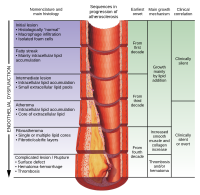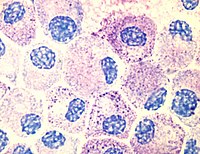
Dichotomous Roles of Smooth Muscle Cell–Derived MCP1 (Monocyte Chemoattractant Protein 1) in Development of Atherosclerosis
Sign Up to like & getrecommendations! Published in 2022 at "Arteriosclerosis, Thrombosis, and Vascular Biology"
DOI: 10.1161/atvbaha.122.317882
Abstract: Background: Smooth muscle cells (SMCs) in atherosclerotic plaque take on multiple nonclassical phenotypes that may affect plaque stability and, therefore, the likelihood of myocardial infarction or stroke. However, the mechanisms by which these cells affect… read more here.
Keywords: monocyte; muscle; atherosclerosis; lgals3 transitioned ... See more keywords

Mcp1 Promotes Macrophage-Dependent Cyst Expansion in Autosomal Dominant Polycystic Kidney Disease.
Sign Up to like & getrecommendations! Published in 2018 at "Journal of the American Society of Nephrology : JASN"
DOI: 10.1681/asn.2018050518
Abstract: BACKGROUND In patients with autosomal dominant polycystic kidney disease (ADPKD), most of whom have a mutation in PKD1 or PKD2, abnormally large numbers of macrophages accumulate around kidney cysts and promote their growth. Research by… read more here.
Keywords: cyst growth; kidney; mcp1; knockout ... See more keywords

MiR-154-5p-MCP1 Axis Regulates Allergic Inflammation by Mediating Cellular Interactions
Sign Up to like & getrecommendations! Published in 2021 at "Frontiers in Immunology"
DOI: 10.3389/fimmu.2021.663726
Abstract: In a previous study, we have demonstrated that p62, a selective receptor of autophagy, can regulate allergic inflammation. In the present study, microRNA array analysis showed that miR-154-5p was increased by antigen (DNP-HSA) in a… read more here.
Keywords: mir 154; allergic inflammation; cellular interactions; mcp1 ... See more keywords

Monocyte Chemotactic Protein-1 (MCP1) Accumulation in Human Osteoclast Precursor Cultures
Sign Up to like & getrecommendations! Published in 2022 at "Life"
DOI: 10.3390/life12060789
Abstract: In vitro osteoclast methods require constant treatment with macrophage colony stimulating factor (M-CSF) to support precursor survival and addition of the differentiation agent receptor activator of NF-κB ligand (RANKL). Constant exposure to granulocyte macrophage colony… read more here.
Keywords: chemotactic protein; csf; protein; monocyte chemotactic ... See more keywords